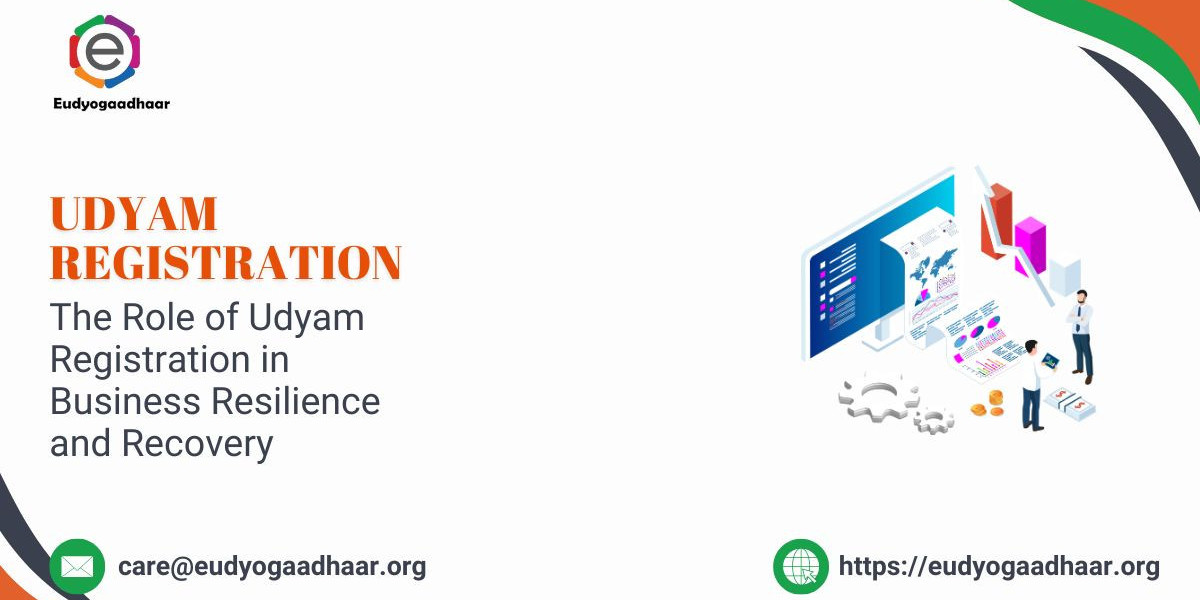Introduction
In the face of economic uncertainties and global disruptions, business resilience and recovery have become paramount concerns for enterprises of all sizes. For Micro, Small, and Medium Enterprises (MSMEs), the challenges are often more pronounced due to limited resources and market reach. Udyam Registration, a government initiative in India, provides a structured framework to support MSMEs, enhancing their resilience and facilitating recovery. This article explores the role of Udyam Registration in bolstering business resilience and aiding recovery efforts, particularly in challenging times.
Understanding Udyam Registration
What is Udyam Registration?
Udyam Registration is an online registration system launched by the Ministry of Micro, Small, and Medium Enterprises (MSME) on July 1, 2020. It replaces the earlier Udyog Aadhaar Memorandum (UAM) scheme, aiming to simplify the registration process for MSMEs and provide them with a unique identification number and certificate. This registration is crucial for MSMEs to access various government benefits, schemes, and incentives.
Benefits of Udyam Registration
Udyam Registration offers several benefits, including:
Access to easier credit and loan facilities.
Eligibility for various subsidies and government schemes.
Protection against delayed payments.
Preference in government tenders and procurement processes.
Enhanced credibility and market visibility.
Enhancing Business Resilience Through Udyam Registration
Financial Support and Credit Access
One of the primary ways Udyam Registration enhances business resilience is by facilitating access to financial support. Registered MSMEs can avail themselves of government-backed schemes such as the Credit Guarantee Fund Scheme for Micro and Small Enterprises (CGTMSE), which provides collateral-free loans. This financial cushion is vital for businesses to manage cash flow, invest in growth, and navigate economic downturns.
Subsidies and Incentives
Registered MSMEs are eligible for various subsidies and incentives that can reduce operational costs and enhance competitiveness. For example, subsidies on technology upgrades, quality certification, and export promotion can significantly improve business efficiency and marketability, making enterprises more resilient to market fluctuations.
Delayed Payment Protection
The MSMED Act mandates that payments to MSMEs must be made within 45 days of delivering goods or services. If payments are delayed, buyers must pay compound interest with monthly rests on the outstanding amount. This legal protection helps MSMEs maintain liquidity and reduces the risk of cash flow disruptions, enhancing their financial stability.
Access to Government Contracts
Udyam Registration provides MSMEs with preferential access to government tenders and procurement processes. The government often reserves a portion of its contracts for registered MSMEs, ensuring a steady stream of business opportunities. This access helps businesses diversify their customer base and reduces dependency on a few clients, thereby enhancing resilience.
Facilitating Business Recovery Post-Disruption
Rapid Recovery Programs
Post-disruption recovery often requires quick access to financial resources and markets. Udyam-registered MSMEs can swiftly access government recovery programs designed to support businesses in distress. These programs may include emergency credit lines, grants, and deferred payment schemes, providing much-needed financial relief to restart operations.
Infrastructure Support
The government offers various infrastructure support schemes to Udyam-registered MSMEs, such as setting up common facility centers and providing subsidized land in industrial parks. These facilities help businesses rebuild and modernize their operations, ensuring a quicker recovery and sustained growth.
Market Expansion and Export Promotion
Udyam Registration opens doors to export promotion schemes, helping businesses expand their market reach internationally. Access to international markets can provide a significant boost to revenue streams, aiding in faster recovery from local economic disruptions. Government initiatives such as the Export Promotion Capital Goods (EPCG) scheme and the Market Access Initiative (MAI) provide financial assistance and resources for MSMEs to explore global opportunities.
Case Studies: Udyam Registration in Action
Case Study 1: A Manufacturing Firm
A small manufacturing firm faced severe disruptions during the COVID-19 pandemic. With dwindling orders and cash flow issues, the business struggled to stay afloat. Upon registering under Udyam, the firm accessed collateral-free loans through the CGTMSE scheme, which provided the necessary capital to maintain operations. Additionally, they received subsidies for technology upgrades, which improved their production efficiency and helped them secure new contracts, ensuring a steady recovery.
Case Study 2: An IT Services Company
An IT services company in a rural area leveraged Udyam Registration to enhance its market presence and resilience. The registration allowed them to bid for government contracts, diversifying their client base. They also accessed skill development programs that improved their workforce's capabilities. As a result, the company not only recovered from the initial economic shock but also expanded its services, entering new markets with increased confidence.
Practical Steps for MSMEs to Leverage Udyam Registration
Step 1: Registering Under Udyam
The first step for MSMEs is to complete the Udyam Registration process. This can be done online through the official Udyam Registration portal. The process requires basic details such as the Aadhar number of the applicant, PAN, and GSTIN of the business, and bank account information.
Step 2: Exploring Available Schemes and Benefits
Once registered, businesses should actively explore the various schemes and benefits available to them. Staying informed about government programs, subsidies, and financial assistance options is crucial for maximizing the advantages of Udyam Registration.
Step 3: Implementing Best Practices
MSMEs should implement best practices in financial management, operations, and market strategies to enhance resilience. Utilizing the resources and support provided through Udyam Registration can significantly bolster these efforts.
Step 4: Networking and Collaboration
Engaging with industry networks and associations can provide valuable insights and opportunities for collaboration. Registered MSMEs can benefit from shared resources, joint ventures, and collective bargaining power, further enhancing their resilience.
Note: Ready to update your Udyam certificate? Click - UPDATE UDYAM REGISTRATION
Conclusion
Udyam Registration plays a pivotal role in enhancing the resilience and recovery capabilities of MSMEs. By providing access to financial support, legal protections, and market opportunities, it empowers businesses to navigate challenges and thrive in competitive environments. For MSMEs, leveraging Udyam Registration is a strategic move towards sustained growth, stability, and success in an ever-evolving economic landscape. Embracing this initiative can significantly contribute to building a resilient and dynamic business ecosystem in India.








